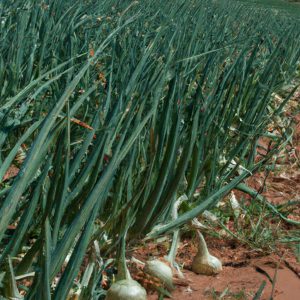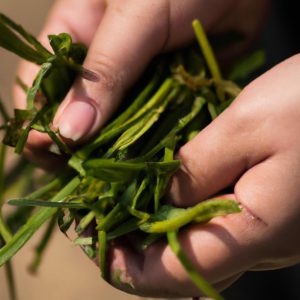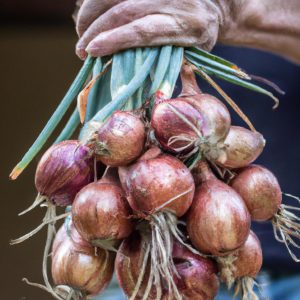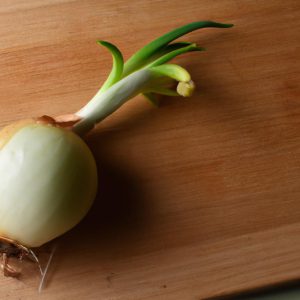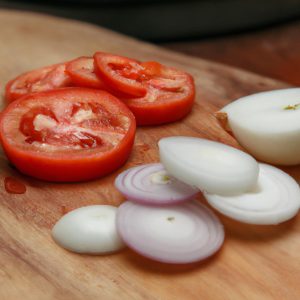As a savvy home cook, you know that onions are an essential ingredient in many dishes. Whether you’re caramelizing them for a savory tart or tossing them into a salad for a bit of crunch, onions are a staple in any kitchen. However, have you ever found yourself wondering how long an onion lasts before it spoils?
Understanding the shelf life of an onion is crucial to avoid waste and ensure that your dishes taste their best. The shelf life of an onion can vary based on several factors, including storage conditions, the type of onion, and the time of year. In this article, we’ll explore everything you need to know about onion shelf life, including how to store onions for longevity, how to tell if an onion has spoiled, and what to do with onions past their expiration date.
So, let’s dive in and explore the fascinating world of onion shelf life!
What is the Shelf Life of Onions?

As with any perishable food, onions have a shelf life that refers to the period during which they retain the best quality for consumption. The shelf life of onions can vary depending on several factors, including storage conditions, the type of onion, and the time of year.
Explanation of shelf life and how it applies to onions
Shelf life refers to the length of time that a product can be stored before it begins to spoil or lose its quality. Onions are no exception, and their shelf life can have an impact on the taste and texture of your dishes.
Factors that affect the shelf life of onions
Several factors can affect the shelf life of onions. Storage conditions, such as temperature and humidity, play a crucial role in how long an onion lasts. Exposure to light, air, and moisture can also impact an onion’s shelf life.
The type of onion can also affect its shelf life. For example, sweet onions, such as Vidalia onions, have a higher water content and a shorter shelf life than yellow onions, which have a lower water content and a longer shelf life.
The time of year can also impact an onion’s shelf life. Onions harvested in the fall and winter tend to have a longer shelf life than those harvested in the spring and summer.
Average shelf life of onions
On average, onions can last anywhere from a few weeks to several months, depending on the factors mentioned above. Yellow onions, for example, can last up to 2-3 months when stored in a cool, dry place. Meanwhile, sweet onions may only last for a few weeks.
Understanding the factors that affect onion shelf life is crucial to ensure that you’re storing your onions correctly and using them at their best quality. In the next section, we’ll explore how to store onions for longevity.
How to Store Onions for Longevity

When it comes to extending the shelf life of onions, proper storage is key. Here are some best practices for storing onions:
Best Storage Practices for Onions
- Keep onions in a cool, dry, and well-ventilated area.
- Store onions away from direct sunlight, which can cause them to sprout.
- Avoid storing onions near other fruits and vegetables, as they release ethylene gas, which can cause onions to spoil faster.
- Store onions in a mesh or wire basket or a paper bag to allow for air circulation.
Methods for Storing Onions
- In a pantry: If you have a cool, dry pantry or cellar, this is an ideal place to store onions. Make sure to keep them away from potatoes, which can cause them to spoil faster.
- In the refrigerator: If you live in a humid climate or have limited storage space, you can store onions in the refrigerator. However, make sure to keep them in a ventilated container or bag to prevent moisture buildup, which can cause them to rot.
- In the freezer: You can also freeze onions to extend their shelf life. To do so, chop or slice them and place them in an airtight container or freezer bag. Frozen onions are best used in cooked dishes, as they can become mushy when thawed.
Tips for Extending the Shelf Life of Onions
- Don’t wash onions before storing them, as moisture can cause them to spoil faster.
- Use the oldest onions first to prevent spoilage.
- Cut onions only when you’re ready to use them, as cut onions spoil faster than whole onions.
- If you notice any mold or soft spots on an onion, discard it immediately to prevent the spread of mold to other onions.
Signs of Spoiled Onions

No one wants to bite into a spoiled onion, as it can ruin the taste of an entire dish and pose potential health risks. Here are some signs to look out for to determine if an onion has gone bad:
Physical signs that indicate an onion has spoiled
- Mold: If you see any green or black mold on the onion, it’s time to toss it out.
- Softness: If the onion feels soft or mushy, it’s likely that it’s gone bad.
- Discoloration: If the onion has turned dark brown or yellow, it’s a sign that it’s no longer fresh.
Odor and taste changes in spoiled onions
- Foul smell: If the onion smells sour or rotten, it’s a clear indication that it’s gone bad.
- Off taste: If the onion tastes bitter or has a strange, unpleasant taste, it’s likely that it’s spoiled.
Health risks associated with consuming spoiled onions
Eating a spoiled onion can put you at risk of food poisoning, which can cause symptoms such as nausea, vomiting, diarrhea, and stomach cramps. If you suspect that you’ve consumed a spoiled onion, it’s essential to seek medical attention immediately, especially if you experience severe symptoms.
In summary, it’s crucial to know the signs of a spoiled onion to avoid using it in your cooking. By discarding any onions that show physical signs of spoilage or have an off smell or taste, you can prevent the risk of food poisoning and ensure that your dishes taste their best.
Using Onions Past their Expiration Date
As much as we try to stay on top of our food storage, sometimes onions can slip through the cracks and end up past their expiration date. While it’s always best to use fresh onions whenever possible, there are still ways to use onions that are past their prime.
Safety Considerations When Using Onions Past their Expiration Date
Before using an onion that is past its expiration date, it’s essential to consider the potential safety risks. Onions that have gone bad can harbor harmful bacteria, which can cause foodborne illnesses. So, it’s essential to assess the onion’s condition and determine if it’s still safe to use.
Ways to Use Onions that are Past their Prime
If you find yourself with an onion that is no longer fresh, don’t toss it out just yet! There are still several ways you can use it in your cooking. One option is to cook the onion, which can help mask any off-flavors and soften the texture. You can also freeze the onion for later use or make a batch of caramelized onions, which will keep in the fridge for up to a week.
Tips for Determining if an Onion is Still Safe to Use
If you’re unsure if an onion is still safe to use, there are a few things you can look out for. Check the onion for any visible signs of spoilage, such as mold, soft spots, or discoloration. You can also give the onion a sniff test to see if it has an off-odor. If the onion looks and smells okay, you can still use it, but be sure to cook it thoroughly to reduce the risk of foodborne illness.
By following these tips, you can make the most of your onions, even if they’ve passed their expiration date. Remember, always practice food safety and use your best judgment when determining if an onion is still safe to eat.
Conclusion
In conclusion, understanding the shelf life of onions is crucial for any home cook. By following proper storage techniques and paying attention to signs of spoilage, you can ensure that your onions last as long as possible. Remember to store onions in a cool, dry place and keep them away from other produce that can cause them to spoil more quickly.
At onionfacts.com, we are committed to providing you with reliable and trustworthy information about all things onions. We hope that this comprehensive guide to onion shelf life has been helpful and informative. By following these tips and tricks, you can keep your onions fresh and flavorful for all your culinary creations.
So, the next time you’re prepping your ingredients for a delicious meal, you can feel confident knowing that your onions will be ready to take center stage. Happy cooking!

